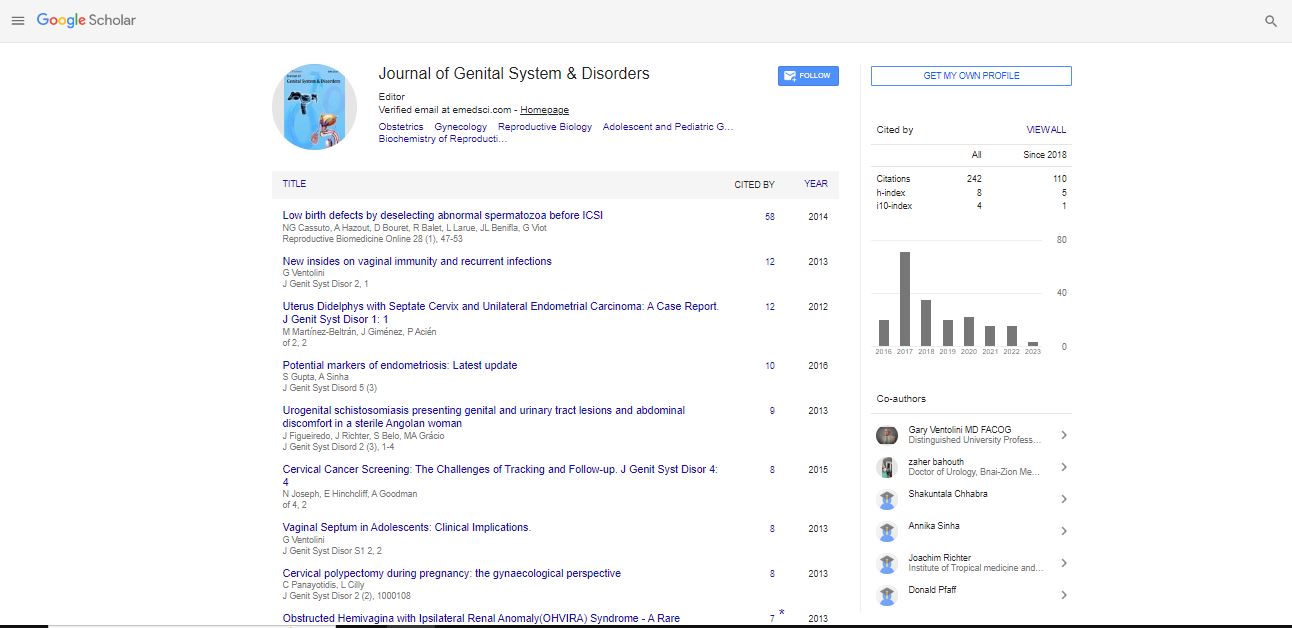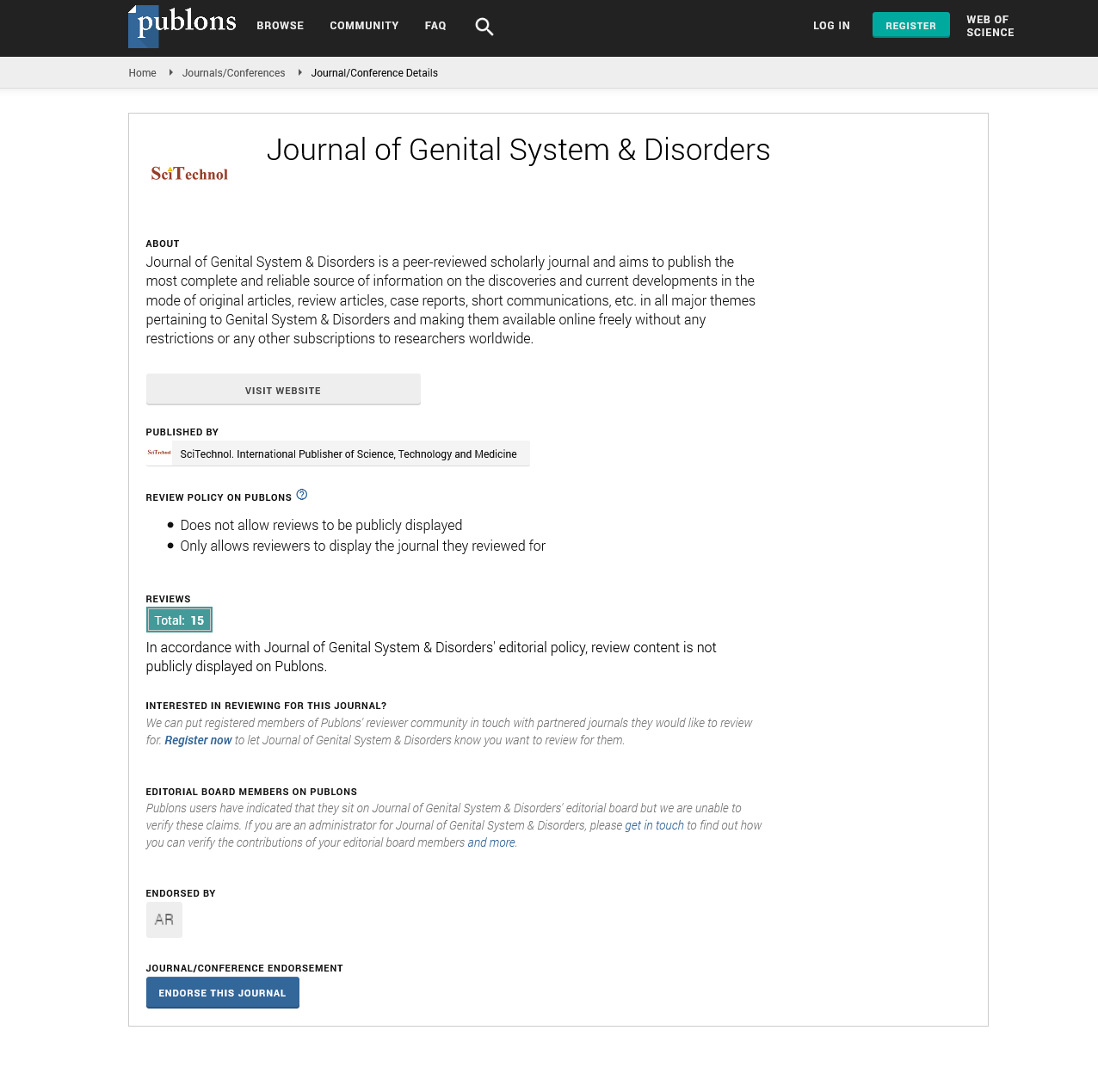Opinion Article, Vol: 12 Issue: 3
Advances in Reproductive Endocrinology Implications for Fertility Treatment
Adam Hellstrom*
1Department of Urology, Tulane University School of Medicine, New Orleans, USA
*Corresponding Author: Adam Hellstrom,
Department of Urology, Tulane
University School of Medicine, New Orleans, USA
E-mail: whellst@adam.edu
Received date: 30 August, 2023, Manuscript No. JGSD-23-117029;
Editor assigned date: 01 September, 2023, PreQC No. JGSD-23-117029 (PQ);
Reviewed date: 15 September, 2023, QC No. JGSD-23-117029;
Revised date: 22 September, 2023, Manuscript No. JGSD-23-117029 (R);
Published date: 29 September, 2023, DOI: 10.4172/2325-9728.1000285
Citation: Hellstrom A (2023) Advances in Reproductive Endocrinology Implications for Fertility Treatment. J Genit Syst Disord 12:3.
Description
Reproductive endocrinology is a branch of medicine that focuses on the intricate interplay between hormonal regulation and reproductive processes. It plays a pivotal role in understanding and addressing issues related to fertility. Infertility, defined as the inability to conceive after a year of regular, unprotected intercourse, affects millions of couples worldwide. While the causes of infertility can be multifaceted, advances in reproductive endocrinology have provided a deeper understanding of the underlying mechanisms and opened new doors for fertility treatment. This essay explores the significance of these advances and their implications for fertility treatment.
Reproductive endocrinology delves into the hormonal control of the female and male reproductive systems. Key hormones involved in these processes include Follicle-Stimulating Hormone (FSH), Luteinizing Hormone (LH), estrogen, progesterone, and testosterone. In females, the menstrual cycle is tightly regulated by these hormones, with FSH and LH playing essential roles in ovulation and the development of the corpus luteum. In males, testosterone is vital for sperm production.
Ovarian stimulation is a cornerstone of many fertility treatments, particularly in In Vitro Fertilization (IVF). Advances in understanding ovarian physiology and hormonal regulation have allowed for more precise and effective ovarian stimulation protocols. By fine-tuning the administration of FSH and LH, clinicians can optimize the number and quality of eggs retrieved during IVF. This has improved the success rates of IVF procedures, offering hope to couples struggling with infertility. Hormonal imbalances can significantly impact fertility. Reproductive endocrinologists now have a better understanding of hormonal disorders, such as Polycystic Ovary Syndrome (PCOS) and hypothalamic amenorrhea. By addressing these hormonal issues through targeted therapies, such as the use of metformin for PCOS or Human Chorionic Gonadotropin (HCG) for hypothalamic amenorrhea, physicians can help restore fertility in many cases. Preimplantation Genetic Testing (PGT) has revolutionized the field of reproductive endocrinology. PGT involves the genetic screening of embryos created through IVF before they are implanted in the uterus. This screening can identify chromosomal abnormalities and genetic diseases, allowing for the selection of the healthiest embryos. As a result, PGT has increased the chances of a successful pregnancy, minimized the risk of genetic disorders, and reduced the number of multiple pregnancies by enabling the transfer of a single, healthy embryo. Advances in reproductive endocrinology have also paved the way for personalized medicine in fertility treatment. Genetic and hormonal profiling can help identify specific issues that may be causing infertility in an individual or couple. This personalized approach allows for tailored treatment plans, addressing the root causes of infertility and increasing the likelihood of a successful pregnancy. Reproductive endocrinology is not limited to female infertility. There have been significant advances in understanding and treating male infertility as well. Hormonal therapies, sperm retrieval techniques, and sperm quality assessment have all improved, offering more options for couples facing male-factor infertility.
The advances in reproductive endocrinology have translated into significantly improved success rates in fertility treatment. IVF, for example, has become more effective due to optimized ovarian stimulation protocols and the use of PGT. These advancements provide hope to couples who may have previously faced the prospect of never achieving a successful pregnancy. One of the concerns in fertility treatment has been the increased risk of multiple pregnancies, which can pose health risks to both the mother and the babies. With the ability to select the healthiest embryo through PGT, there is less reliance on transferring multiple embryos, leading to a reduced risk of multiple pregnancies. Reproductive endocrinology's focus on understanding the hormonal and genetic aspects of fertility allows for early diagnosis and intervention. Identifying and addressing the root causes of infertility at an earlier stage can lead to more effective treatment and better outcomes. Infertility can be emotionally and mentally taxing for individuals and couples. Advances in reproductive endocrinology offer new hope and better solutions, ultimately improving the quality of life for those struggling with fertility issues. The reduced emotional burden and increased chances of success can positively impact mental well-being. While the advances in reproductive endocrinology have brought about remarkable opportunities for fertility treatment, they also raise ethical and social considerations. Questions regarding the ethics of genetic selection, the potential for designer babies, and access to advanced treatments need to be addressed by the medical community, policymakers, and society at large.
Advances in reproductive endocrinology have ushered in a new era of fertility treatment, offering hope and practical solutions to couples facing infertility. By delving into the intricacies of hormonal regulation, ovarian stimulation, genetic screening, and personalized medicine, reproductive endocrinologists have made significant strides in understanding and addressing the complex issues surrounding infertility. The implications of these advances are profound, leading to improved success rates, reduced risks, early intervention, and enhanced quality of life for those on the fertility journey. However, as these advancements continue, it is essential to consider the ethical and social implications that come with such powerful tools, ensuring that they are used responsibly and for the benefit of all.
 Spanish
Spanish  Chinese
Chinese  Russian
Russian  German
German  French
French  Japanese
Japanese  Portuguese
Portuguese  Hindi
Hindi 
